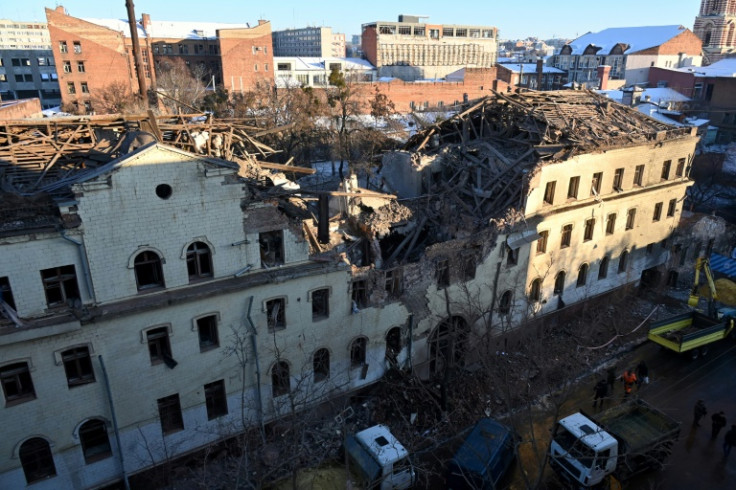
Russia's accusation last week that France was funding mercenaries to fight in Ukraine has been widely echoed on social media, but French officials see it as the start of a new disinformation campaign.
The dispute began when the Russian defence ministry said on January 17 that it had carried out a "precision strike" on a temporary base for foreign fighters in the eastern Ukrainian city of Kharkiv, saying the bulk of them were "French mercenaries".
Without providing evidence, the ministry claimed that dozens of foreign nationals were killed in the attack and many wounded. On Wednesday, the Russian parliament adopted a resolution slamming the presences of French "mercenaries" in Ukraine.
But in a growing information battle between Paris and Moscow played out on social media, the French foreign ministry has vehemently denied the claim, calling it "another clumsy Russian manipulation".
"France has no 'mercenaries' either in Ukraine or anywhere else, unlike some people," it added, referring to activities of Russian mercenaries in Ukraine and also the Middle East and Africa.
France has repeatedly accused Russia of disinformation attacks.
In June, Paris pointed to a huge digital influence operation publishing anti-Ukraine content on websites imitating major French newspapers. One such article claimed France would introduce a new tax to finance its support to Kyiv.
One pro-Russian outfit based in France, SOS Donbass, on Monday published via the Russian news agency Ria Novosti a list naming 13 alleged "French mercenaries" it claims were in Kharkiv at the time of the Russian strike.
"The most critical information -- alive or dead, rank, and so on -- will be released later, as well as further names," said SOS Donbass chief Anna Novikova, who holds French and Russian nationality.
A second list of 30 alleged French "mercenaries" is also being shared through the Telegram messaging app.
"Both lists are widely available on social networks" and have been spread by dozens of pro-Russian sites, a French source familiar with the case acknowledged.
Moscow's choice of the word "mercenary" implies that France is breaking its own law against its citizens working abroad as guns-for-hire -- a crime punishable by five years in prison and a fine of 75,000 euros ($81,000).
It remains unclear whether any French citizens were in fact killed in Kharkiv, as some of the names on the lists were false, a French diplomatic source said.
Foreign volunteers -- including according to various sources several dozen French, including some from the far right -- have flowed into Ukraine since the early months of the conflict.
Some of the named French individuals appear to belong to Ukraine's International Legion of foreign volunteers.
But multiple French sources agreed that none had been killed in the Russian strike.
"As far as we know, no French citizen died in Kharkiv" last week, said a French security source, who asked not to be named.
A Kyiv-based security expert in touch with French members of the International Legion added that "there aren't many of them" in Ukraine, with those present split among different units.
"All the guys I know are alive. They haven't heard of anyone getting hurt" in Kharkiv, the expert, who also requested anonymity due to the sensitivity of the issue, told AFP.
"I'm alive, everything's fine! Russian disinformation," one of the 13 French citizens on the SOS Donbass list wrote on Facebook early Tuesday, in a message seen by AFP before it was deleted.
Rybar, a Telegram channel close to the Russian military, has also cast doubt on the 13-name list.
"The credibility of this new list, which attempts to bolster the previous list published back in November, appears highly questionable."
The claim from Moscow followed a slew of new French promises of weapons to Kyiv and ahead of a planned French-Ukrainian security agreement.
One senior French military officer argued that Russia's allegations have matched step for step Paris's announcements of aid for Ukraine.
"Russia is using the information space to respond to the political space" and undermine the credibility of Ukraine's Western backers, he told AFP on condition of anonymity.







